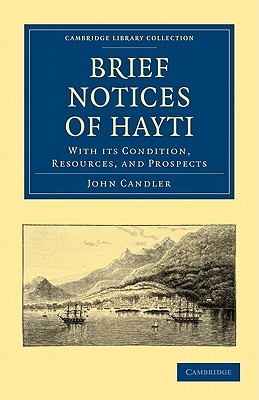
- We will send in 10–14 business days.
- Author: John Chandler
- Publisher: Cambridge University Press
- ISBN-10: 1108024386
- ISBN-13: 9781108024389
- Format: 14 x 21.6 x 1.1 cm, minkšti viršeliai
- Language: English
- SAVE -10% with code: EXTRA
Reviews
Description
John Candler (1787-1869), a Quaker Abolitionist, visited the West Indies between 1839 and 1841, to study the situation of ex-slaves since they had obtained their freedom. He spent three months in Haiti, and appears to have been generally impressed by what he found. The former slaves had become smallholders, growing crops on small plots of land, though they were not interested in producing more than they needed for their basic livelihood. The export of coffee, cotton and tobacco had declined since the end of slavery, and the sugar trade had ended. Whites were barred from owning land, or from marrying Haitians, and were restricted in trading activities, reducing available investment capital. The compensation demanded by France to the former plantation owners was also crippling the economic development of the island. Candler's book gives much valuable detail about an important former colony at a time of transition.
EXTRA 10 % discount with code: EXTRA
The promotion ends in 22d.03:02:54
The discount code is valid when purchasing from 10 €. Discounts do not stack.
- Author: John Chandler
- Publisher: Cambridge University Press
- ISBN-10: 1108024386
- ISBN-13: 9781108024389
- Format: 14 x 21.6 x 1.1 cm, minkšti viršeliai
- Language: English English
John Candler (1787-1869), a Quaker Abolitionist, visited the West Indies between 1839 and 1841, to study the situation of ex-slaves since they had obtained their freedom. He spent three months in Haiti, and appears to have been generally impressed by what he found. The former slaves had become smallholders, growing crops on small plots of land, though they were not interested in producing more than they needed for their basic livelihood. The export of coffee, cotton and tobacco had declined since the end of slavery, and the sugar trade had ended. Whites were barred from owning land, or from marrying Haitians, and were restricted in trading activities, reducing available investment capital. The compensation demanded by France to the former plantation owners was also crippling the economic development of the island. Candler's book gives much valuable detail about an important former colony at a time of transition.


Reviews